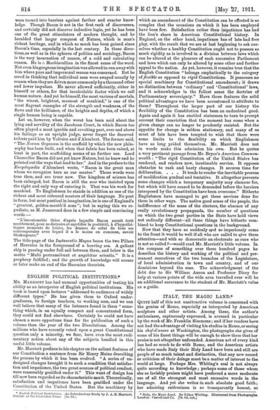ENGLISH POLITICAL INSTITUTIONS.*
MR. MARRIOTT has had unusual opportunities of testing his ability as an interpreter of English political institutions. His book is based upon lectures " addressed to audiences of widely different types." He has given them to Oxford under- graduates, to foreign teachers, to working men, and we can well believe that many of the listeners found in them " some- thing which, in an equally compact and concentrated form, they could not find elsewhere. Certainly be could not have chosen a more opportune time for the publication of such a volume than the year of the two Dissolutions. Among the millions who have recently voted upon a great Constitutional question only a minority, we fear, have even the most rudi- mentary notion about any of the subjects handled in this useful little volume.
Mr. Marriott prefixes to his chapter on the salient features of our Constitution a sentence from Sir Henry Maine describing the process by which it has been evolved. "A series of un- designed changes brought it to such a condition that satisfac- tion and impatience, the two great sources of political conduct, were reasonably gratified under it." This want of design has till now been regarded as its characteristic merit. Theoretically, satisfaction and impatience have been gratified under the Constitution of the United States. But the machinery by
• English Political Institutions. An Introductory Study by J. A. R. Marriott. Oxford : at the Clarendon Press. [4u. 6d.]
which an amendment of the Constitution can be effected is so complex that the occasions on which it has been employed have been few. Satisfaction rather than impatience has bad the lion's share in American Constitutional history. In England, on the other hand, impatience has of late had free play, with the result that we are at last beginning to ask our- selves whether a healthy Constitution ought not to possess so much rigidity as is involved in a division between laws which can be altered at the pleasure of each successive Parliament and laws which can only be altered by some other and further appeal to the nation. As yet, however, it remains true that the English Constitution " belongs emphatically to the category of flexible as opposed to rigid Constitutions. It possesses no special machinery for Constitutional amendment; it draws no distinction between `ordinary' and Constitutional' laws, and it acknowledges in the fullest sense i4e doctrine of Parliamentary sovereignty." Have these features the solid political advantages we have been accustomed to attribute to them P Throughout the larger part of our history the flexibility of the Constitution has been an undoubted good. Again and again it has enabled statesmen to turn to prompt account their conviction that the moment has come when a given change can no longer be prudently resisted. But the appetite for change is seldom stationary, and many of us must of late have been tempted to wish that there were some limits to the flexibility on which Englishmen have so long prided themselves. Mr. Marriott does not in words make this admission his own. But he quotes a very pertinent passage from Mr. Bryce's American Common- wealth : "The rigid Constitution of the United States has rendered, and renders now, inestimable service. It opposes obstacles to rash and hasty changes. It secures time for deliberation. . . . It tends to render the inevitable process of modification gradual and tentative. It altogether prevents Some changes which a temporary majority may clamour for, but which will have ceased to be demanded before the barriers interposed by the Constitution have been overcome." Hitherto Englishmen have managed to get these services done for them in other ways. The native good sense of the people, the indifference of the mass of the electors, the absence of any really revolutionary propaganda, the number of questions on which the two great parties in the State have held views not radically different—all these things have hitherto com- bined to keep Constitutional questions in the background.
Now that they have so suddenly BM so imperiously come to the front it would be well if all who are called to give them attention—and with so democratic an electorate as ours who is not so called P—would read Mr. Marriott's little volume. In the compass of something over three hundred pages he describes the history and working of the political and per- manent executives of the two branches of the Legislature, of local administration in town and country, and of our dominions beyond the seas. The acknowledgment of the debt due to Sir William Anson and Professor Dicey for help at various points of the wide area travelled over will be an additional assurance to the student of Mr. Marriott's value as a guide.










































 Previous page
Previous page